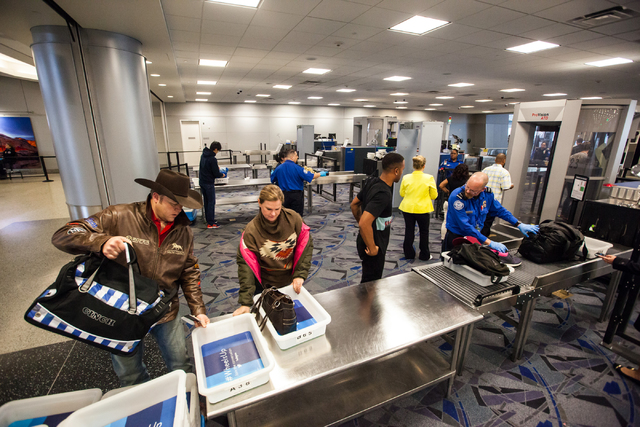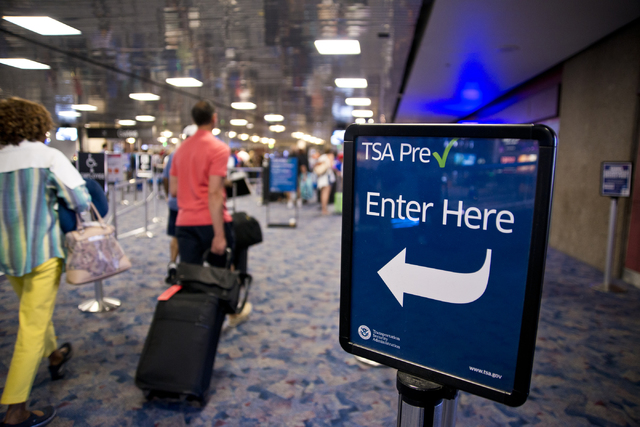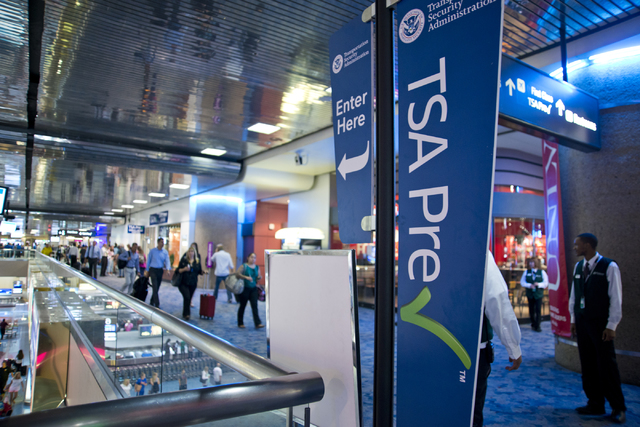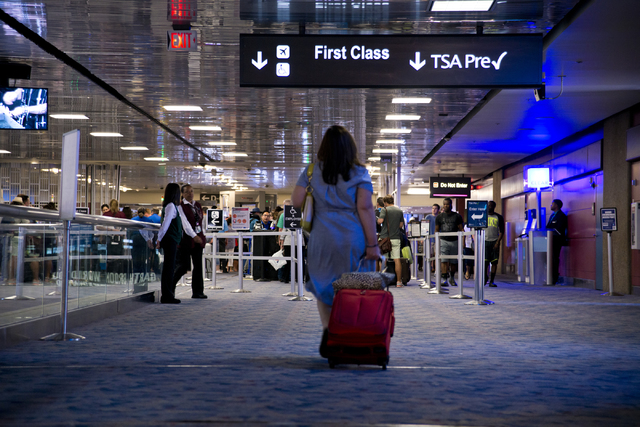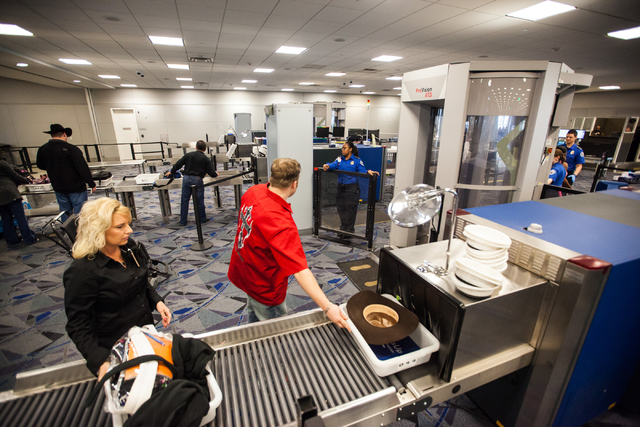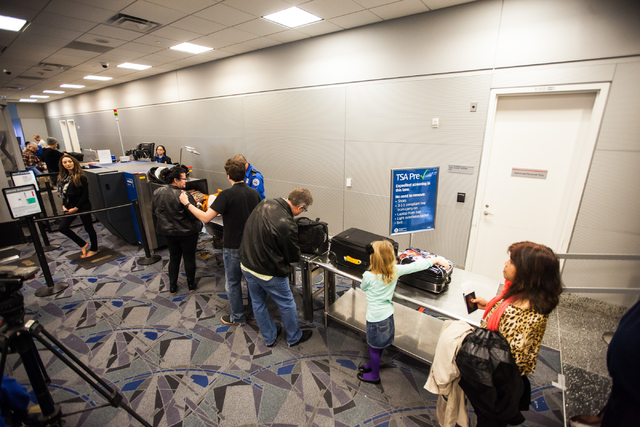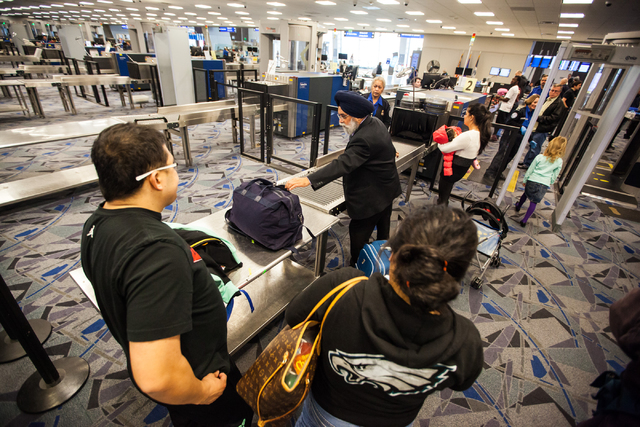Nevada officials worried that proposed budget cuts, fee increases may hurt McCarran
WASHINGTON — Nevada officials are sounding the alarm that a proposed airline passenger fee increase and program cuts in the proposed federal budget could impact screening at McCarran International Airport and dampen the state’s tourism industry.
The fee hike and cut are in the $44 billion proposed budget for the Transportation Security Administration.
Republican and Democratic lawmakers have urged the Trump administration to reconsider the cuts to three post-9/11 security programs administered by TSA and a $1 increase in the fee for security charged on airline tickets.
“We are always concerned with an increase in fees for passengers because we are a price-sensitive destination,” said Catherine Crews, a spokeswoman for McCarran and the Clark County Department of Aviation in Las Vegas.
Crews said “we’re especially concerned when an increase is not going to benefit the airport or aviation industry.”
A portion of the last increase was diverted to the Treasury for deficit reduction, she said.
President Donald Trump is seeking cuts in his fiscal year 2018 budget to help pay for big-ticket items like a wall along the U.S.-Mexico border and $54 billion for aircraft, ships and weaponry for the military.
DELEGATION CONCERNED
Nevada Sens. Dean Heller, a Republican, and Catherine Cortez Masto, a Democrat, voiced concerns about the cuts to Homeland Security Secretary John Kelly.
The Las Vegas congressional delegation worries that the fee increase alone could cut visitors traveling through McCarran, which saw 47 million people go through airline gates in 2016. Program cuts, they said, could impact security screening efficiency.
“A cut of this size would not only have a significant adverse effect on our national security, but it would also impact Nevada’s tourism industry, a significant economic driver in our state,” said Rep. Jacky Rosen, D-Nev., in a letter to Kelly.
That letter was also signed by Rep. Ruben Kihuen and Rep. Dina Titus, both Democrats.
But Trump, in his budget blueprint this month, said “these cuts are sensible and rational.”
“Every agency and department will be driven to achieve greater efficiency to eliminate wasteful spending,” Trump said.
Although Republican leaders have declared the Trump budget “dead on arrival,” because of cuts to programs championed by individual lawmakers, the president’s blueprint serves as a starting point to the appropriations process that leads to spending bills that fund the government.
The Homeland Security budget draft for fiscal 2018, which begins Oct. 1, includes $2.6 billion for design and construction of the U.S.-Mexico border.
To help offset the wall cost, the budget blueprint also includes $80 million in cuts to TSA by eliminating three programs instituted after the Sept. 11, 2001 terrorist attacks on Washington and New York.
The budget also calls for raising the fee that airlines charge passengers to pay for TSA services by $1 to $5.60 per one-way ticket.
IMPACT ON TOURISM
Cortez Masto warned Kelly earlier this month that changes in TSA programs could increase waiting times at airports and reduce traveler confidence.
“Diverting funds from the TSA to construct a wall along the southern border is an inefficient use of taxpayer money,” Cortez Masto said.
Heller, in a letter to Kelly on Thursday, noted that tourism in Nevada in 2015 resulted in $64 billion in travel spending, and $3.2 billion in state and local tax revenue. Efficient screening by TSA and Customs and Border Protection agents of domestic and foreign travelers is essential, he said.
“Unnecessary disruptions to the travel system significantly impact the consumer experience, and studies show those negative feelings disproportionately damage communities that rely on tourism,” Heller said.
The Trump budget claims the increase in the TSA passenger security fee charged to passengers is needed to keep up with costs.
In addition to an increase in the fee, the Trump budget also seeks to cut TSA grants to state and local police to patrol and provide additional security at or around airports.
McCarran does not receive TSA reimbursement for Las Vegas Metro Police Department officers who patrol around the airport.
It does receive reimbursement for local officers who provide additional security at checkpoints, Crews said. That program is still in the budget and resulted in a $803,000 reimbursement in 2016.
“Our biggest concern is TSA’s ability to fill vacant positions due to natural attrition as well as fund the full complement of canine teams assigned to LAS,” Crews said.
Another program eyed for elimination is the Visible Intermodal Prevention and Response, which uses highly visible teams of uniformed TSA officers to do random sweeps at airports in cities where sporting or political events are taking place.
The budget also includes the 2016 TSA decision to eliminate the Behavior Detection Officer program, which deploys officers to engage with airport passengers to detect potential risks before screening.
Contact Gary Martin at 202-662-7390 or gmartin@reviewjournal.com. Follow @garymartindc on Twitter.
Budget Proposal for TSA
Includes program cuts and fee increases to save $80 million
*Raises TSA Passenger Security Fee by $1 to $5.60 for each one-way ticket
*Cuts TSA grants to states and local law enforcement to provide additional security at airports
*Eliminates the Visible Intermodal Prevention and Response program, which uses teams of highly visible TSA officers to do sweeps at airports in cities where large events are taking place
*Codifies the 2016 TSA decision to eliminate the Behavior Detection Officer program, designed to identify potential risks by passengers in airports before or during the screening process
Source: Office of Management and Budget



